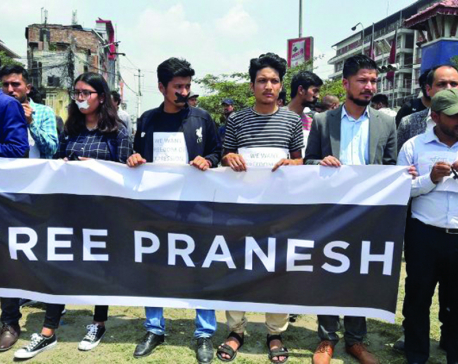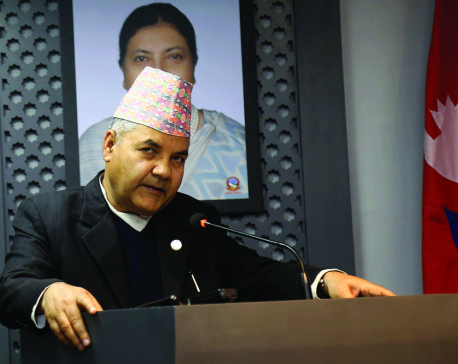
OR


Mohan Nepali
The author is a freelance media researcher, with specialization in Mass Communication and Journalismnews@myrepublica.com
Should the draft bill with provisions of harsh penalties and prison terms be passed, it will discourage professional journalism, while promoting servile psychology and self-censorship
The proposed Media Council Bill, terrorizing media sector with possible criminal prosecutions, indicates that the government is less mindful of fourth state’s vital role of independently monitoring public affairs. It is worth questioning why the government prioritizes the institutionalization of anti-press punishment instead of ensuring the optimal utilization of constitutionally guaranteed press freedom as an integral component of democracy. Journalists have termed the government step as ‘mysterious’. They smell the infiltrated role of regressive elements within ‘power quarters’.
The proposed bill has agitated Federation of Nepali Journalists (FNJ) and other media stakeholders. Even National Human Rights Commission (NHRC) has objected to the press-unfriendly provisions. There is a complaint that the bill was prepared without consultation with the vital stakeholders such as FNJ, Press Council and others. Journalists fear the government-controlled media monitoring mechanism authorized to act as judiciary will be used as a tool to target journalists.
It is more than obvious that Nepal today has witnessed the massive destruction of her native economy, with an annual trade deficit worth billions of rupees. This is abnormal. This is the time for media and other stakeholders to engage in soul-searching national debate on this extremely sensitive issue. Nepal’s anarchic markets exacerbated by nontransparent multi-layered go-betweens are time and again exposed by media outlets, though not very adequately and comprehensively. While the need is to utilize constitutionally guaranteed press freedom to safeguard democracy, the government has come up with draconian media bill.
Curtailing freedom
Following the revelation of a number of corruption scandals, the government seems to be making a desperate attempt to impose restrictions on media freedom by imposing financial penalties that journalists are not able to pay. If the bill is endorsed into an Act it will further jeopardize ordinary people’s lives, re-strengthening overruling non-state forces. It will not only cast a negative image of the federal democratic republic but also hinder empowering millions of poverty-stricken Nepalis, including millions of others politically, economically and socially marginalized.
As the illegal brokering industry, already decapacitating our national economy and productivity, has boomed in every nook and corner, media’s investigative and revelatory capacity needs to be further enhanced. But the restrictive media bill, unexpected of a democratically elected government, will surely diminish journalistic productivity. Since ethical journalism is a matter of creating and consolidating value-based journalistic foundations, a media-phobic political attitude is likely to fail utterly in the long run. Undermining journalistic freedom under any pretext will finally entrench corruption behind the curtains. Should the draft bill with provisions of extremely harsh financial penalties and prison terms be passed, it will discourage professional journalism, while promoting servile psychology and self-censorship among journalists, even causing journalistic deviations. News production and dissemination is a basic ingredient of modern democratic decision making process. It will be detrimental to think ill of media freedom—the heart of functioning democracy.
Leave it free
There indubitably exist plural contradictions in the Nepali society which need to be brought into peaceful dialogue and debate. Societal stakeholders, including state policy formulators, cannot enjoy an opportunity to grasp one another more objectively in absence of media as an independent watchdog. Critical and analytical discourses, including objective information dissemination, are vital to the smooth functioning of democracy. While the modern society considers press freedom as the flipside of democracy, an attempt to form a punishing media council, if it succeeds, will not only undermine the quality of journalism but also make stronger the hands of corrupt and criminal elements across the country. Besides, curtailed press freedom will result in the underreporting of deep-rooted political and socio-economic contradictions. Merely parroted and self-censored information will empower neither power-holders nor citizens.
The proposed draft bill authorizes the media council to frame a journalistic code of conduct, monitor media and determine penalties and compensation. The financial penalties will run up to one million rupees, an amount equal to five years’ remuneration as per the per capita income of Nepali journalists. This smacks of a design to curtail independent and critical journalism under the veil of regulation. In case government authorities feel a news story is against sovereignty, territorial integrity and law and order, accused journalists may have to face a prison term of three to eight years. Due to lack of concrete and clear definitions of violations, any journalists might be targeted. Journalists fear that if such a bill is passed, politically appointed partisan authorities will throttle press freedom, ultimately contributing to the unhindered multiplication of corruption. If the government succeeds in this move, media will not be able to independently monitor the government, which will monitor and control media instead. In such a case, it will be extremely difficult for journalists to inform people independently on ever-accelerating corruption scandals, along with the characters involved therein.
If the proposed draft bill comes up as a law, the series of other harsher laws may follow, threatening people’s fundamental rights. Moreover, it cannot be guaranteed that law-enforcing leadership politically appointed by the government will be wise and self-conscientious enough. Thus all might suffer should such a bill be approved of.
So far, Nepali media and journalists have played a vital role in safeguarding the nation’s independence, sovereignty and territorial integrity. Weakened and tortured media cannot do so. Media and journalists naturally have their shortcomings, which they need to eliminate. They need to develop their own wisdom and insight to build a rich civic consciousness without which totalitarian tactics, coupled with corruption and black businesses, cannot be overcome. However, the proposed draft bill running counter to the constitutional spirit is not an elixir to all media-related problems. Since, the country’s other laws equally apply to disguised journalists when they commit crimes, it would be advisable that the government withdraw this bill. Members of Parliament should not forget that press freedom is for making democracy vibrant and people-oriented. Press freedom must not be thought of as a problem, while we, to a greater extent, lack good governance, transparency and accountability.
To make state and non-state actors accountable, press freedom is a vital prerequisite. Its better utilization for the wellbeing of the greatest number of people should be our orientation. We should be guided by wisdom and self-conscientiousness.
Wise guidance—not cruelties—can enhance journalistic performance.
The author is a freelance media researcher, with specialization in Mass Communication and Journalism
You May Like This

Let freedom rule
We cannot let the police to decide which expressions are criminal, which opinions are unsayable, which ideas are beyond humor or... Read More...

Whose Media Council?
Drop the draft bill, don’t even consider revising it. Rather, force the media community to form their own independent... Read More...

Let the press be free
It’s becoming official: The government of K P Sharma Oli is turning hostile toward press. One after other press-related bill... Read More...






Just In
- Challenges Confronting the New Coalition
- NRB introduces cautiously flexible measures to address ongoing slowdown in various economic sectors
- Forced Covid-19 cremations: is it too late for redemption?
- NRB to provide collateral-free loans to foreign employment seekers
- NEB to publish Grade 12 results next week
- Body handover begins; Relatives remain dissatisfied with insurance, compensation amount
- NC defers its plan to join Koshi govt
- NRB to review microfinance loan interest rate











Leave A Comment